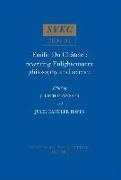Read more
Until recently, the marquise Du Châtelet (1706-1749) was
more remembered as the companion of Voltaire than as
an intellectual in her own right. While much has been
written about his extraordinary output during the years
he spent in her company, her own work has often been
overshadowed. This volume brings renewed attention to
Du Châtelet's intellectual achievements, including her
free translation of selections from Bernard Mandeville's
Fable of the bees; her dissertation on the nature and propagation
of fire for the 1738 prize competition of the Académie
des sciences; the 1740 Institutions de physique and
ensuing exchange with the perpetual secretary of the
Académie, Dortous de Mairan; her two-volume exegesis
of the Bible; the translation of and commentary on Isaac
Newton's Principia; and her semi-autobiographical Discours
sur le bonheur. It is a measure of the breadth of her interests
that the contributions to this volume come from
experts in a wide range of disciplines: comparative literature,
art history, the history of mathematics and
science, philosophy, the history of publishing, and translation
studies. Du Châtelet's partnership with Voltaire is
reflected in a number of the essays; they borrowed from
each other's writings, from the discussions they had together,
and from their shared readings. Essays examine
representations of her by her contemporaries and posterity,
that range from her inclusion in a German portrait
gallery of learned men and women, to the scathing
portrait in Françoise de Graffigny's correspondence, and
nineteenth-century accounts coloured by conflicting
views of the ancien régime. Other essays offer close readings
of her work, and set her activities and writings in their
intellectual and social contexts. Finally, they speculate on
the ways in which she presented herself and what that
might tell us about the challenges and possibilities facing an
exceptional woman of rank and privilege in eighteenth-century
society.

